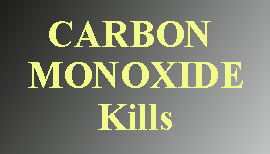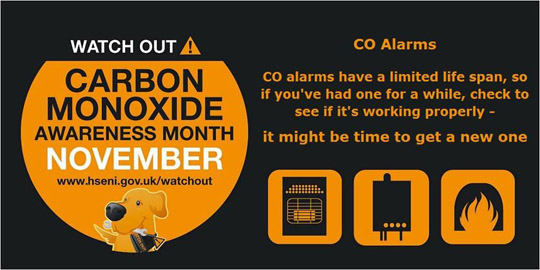As winter progresses, how confident are you that your solid fuel heating system performing safely?
Enterprise, Trade and Investment Minister Jonathan Bell is calling on everyone to support this year’s Carbon Monoxide Awareness Month.
Now in its third year, the annual safety initiative has been developed by members of the NI Carbon Monoxide Safety Group to help protect the public from deadly carbon monoxide (CO) gas.
CO is produced by the incomplete combustion of solid, liquid, and gaseous fuels and is a highly poisonous gas which is impossible to see, taste or smell. It is often known as the ‘silent killer’.
[caption id="attachment_59808" align="alignright" width="270"] How safe is your solid fuel heating system?[/caption]
How safe is your solid fuel heating system?[/caption]
Early symptoms of CO poisoning can mimic many common ailments and may easily be confused with food poisoning, viral infections, flu or simple tiredness.
If fuel-burning appliances are not installed, maintained, and used properly, carbon monoxide can build up to dangerous and even deadly levels, particularly in poorly ventilated areas.
Urging everyone to be aware of the dangers and to take action to protect themselves and their loved ones, Jonathan Bell said: “Any of us who use appliances that burn fossil fuels, such as gas, oil, coal, peat or wood, could be at risk from CO poisoning. The best protection is to make sure all fuel-burning appliances are properly installed – and serviced at least once a year by a registered engineer.
“Also, ensure that all chimneys and flues are inspected annually and swept, if required, by a registered technician.
“As a back-up measure, you should also install an audible carbon monoxide alarm. CO alarms have a limited lifespan, so if you already have one fitted in your home, please check to make sure it is working properly. By taking these simple steps you can help save lives.”
 Householders should also remember that before installing a new solid fuel appliance, or relining or installing flues and chimneys for these appliances, it is a legal requirement to submit an application for building regulation approval. You should contact your local council’s building control department before you start this work.
Householders should also remember that before installing a new solid fuel appliance, or relining or installing flues and chimneys for these appliances, it is a legal requirement to submit an application for building regulation approval. You should contact your local council’s building control department before you start this work.
Remember to always follow the manufacturer’s instructions for all boilers, stoves, gas fires and solid fuel room heaters.
During the month members of the Carbon Monoxide Safety Group and organisations in the private and public sector will help promote carbon monoxide awareness. You can help by sharing safety messages posted on the Health and Safety Executive HSENI’s @Hsenigov on Twitter and Facebook pages during November.
For more information contact the Health and Safety Executive for Northern Ireland on: 0800 0320 121 or visit: http://www.hseni.gov.uk/watchout
***
Carbon monoxide is a highly poisonous gas. Anyone who uses an appliance that burns a fossil fuel including gas, oil and coal as well peat and wood, is potentially at risk from carbon monoxide poisoning. Aside from deaths, many more people will have suffered lasting damage to their health by lower level exposure to carbon monoxide, causing a series of flu-like symptoms, such as headaches, nausea, breathlessness, dizziness, collapse and loss of consciousness, to more serious conditions such as nerve damage, memory loss and personality change.
Audible carbon monoxide alarms can offer back-up precaution to the servicing of fuel burning appliances in all homes. However, while carbon monoxide alarms can help alert you to the dangers if CO gas escapes they must never be regarded as a substitute for the proper installation, maintenance, servicing and cleaning of appliances that use gas, coal, oil or any other solid fuel.
Carbon monoxide alarms are a mandatory requirement for all new homes built in Northern Ireland after a change to The Building Regulations (Northern Ireland) 2012 came into operation on 31 October 2012.
www.hseni.gov.uk/co-booklet-small-nov-2014.pdf
Members of the CO Safety Group include: Royal Society for the Prevention of Accidents (ROSPA), Northern Ireland Fire & Rescue Service (NIFRS), General Consumer Council (GCC), Public Health Agency NI (PHA), the Department of Health, Social Services and Public Safety, the Southern Health and Social Care Trust, The Oil Firing Technical Association (OFTEC), Queens University Belfast (QUB), University of Ulster (UU), Age NI, The Northern Ireland Association of Chimney Sweeps (NIACS), Gas Safe Register (GSR), Phoenix Energy Services, Firmus Energy, Calor, Flogas, NI Home Safety Check Scheme and local councils.
]]>























